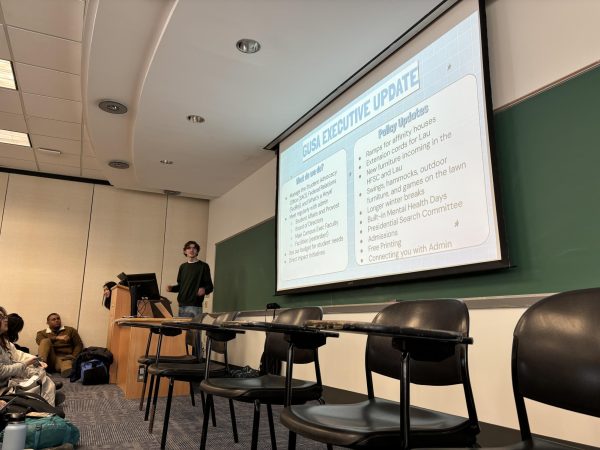The Georgetown University Student Association (GUSA) and administrators from the Office of Residential Living and the Center for Student Engagement (CSE) updated students on campus issues, including housing and administrator accessibility, at a town hall meeting Feb. 21.
The meeting included updates from GUSA President Ethan Henshaw (CAS ’26) on his administration’s activities as well as presentations from CSE and Residential Living administrators about the housing selection process. During the town hall, which turned students away due to room capacity limitations, GUSA senators promoted ongoing efforts to fund events celebrating cultural diversity, plan an upcoming Arts Week and connect students with administrators.

Bill Huff, the executive director of residential operations and business development, said this year’s housing selection process will be unpredictable due to the opening of the redeveloped Henle Village, temporarily dubbed the New Residential Complex (NRC). The NRC, which has been under construction since the closure of Henle in 2023, remains on track to open ahead of the Fall 2025 semester. The complex is being referred to as the NRC while the university searches for a donor to permanently name the apartment complex, according to Huff.
Henshaw said support from the wider student body is necessary for GUSA to best accomplish its priorities and serve student interests.
“There are things that we can get done with negotiation, with student support,” Henshaw said at the event. “Obviously, if it’s just us, it doesn’t really mean anything at that point anymore. If they feel like it’s just us, they’re not going to listen to us, but a lot of this has been a great opportunity to change things on campus.”
Henshaw said the GUSA Executive — which includes a number of advocacy groups in addition to Henshaw and Vice President Darius Wagner (CAS ’27) — ordered additional extension cords for Lauinger Library and the Leavey Center, while advocating for refreshed furniture across campus and the installation of table games.
Henshaw also announced that the Main Campus Executive Faculty, a faculty legislative body, approached him with a proposal to end 8 a.m. classes.
In addition, Finance and Appropriations (FinApp) Committee Chair Tina Solki (MSB, SFS ’26) said the senate’s Diversity Fund has successfully supported events celebrating cultural diversity on campus.
“Some of the most striking moments have been intrinsically tied to experiencing cultural diversity,” Solki said at the event. “I’m really proud of the fact that we funded a lot of events that otherwise wouldn’t have happened without this Diversity Fund.”
According to Solki and Senator Nikki Jiang (SOH ’28), student groups including the Asian-American Student Association (AASA), Vietnamese Student Association (VSA), (No) Pressure Creatives — an Asian-American musical production group — and Georgetown University Radio (WGTB) have benefited from Diversity Fund support. The fund has approximately $20,000 left to distribute this semester, including $15,000 of Student Activities Fee funding allocated by FinApp and a $15,000 contribution from the Office of the Vice President for Student Affairs.
Solki said GUSA’s Arts Week, a week-long celebration of the arts at Georgetown, would return in April. Arts Week programming has not been held since 2019 due to the COVID-19 pandemic.
“For a while, it was kind of just an excuse to bring a couple speakers to campus; it wasn’t as big of a thing as we’re trying to make it this year,” Solki said. “This is the first year that we’re bringing it back in the last five. We’re planning on bringing the arts to you.”
Vice Speaker Meriam Ahmad (SFS ’26) said GUSA’s Dining Committee has been successful in improving access to food on campus by expanding mid-afternoon offerings at Leo J. O’Donovan Dining Hall (Leo’s).
“We successfully abolished light lunch recently, which is amazing,” Ahmad said at the meeting. “It’s just going to be continuous breakfast, lunch, dinner — which is huge — and that is specifically because we told them the feedback that students want to have lunch hours that are continuous.”
The Dining Committee, which is open to both GUSA members and non-members, has also advocated for fresh fruit at Leo’s and expanding late-night offerings at Epicurean, a campus dining location in Darnall Hall, according to Ahmad.
Henshaw said he hopes to build on the Dining Committee’s success to facilitate communication between the administration and students who do not hold roles within GUSA.
“We’ve been trying to replicate that model across other things,” Henshaw said. “It’s also more effective when they’re forced to sit down with other students and not just me every week, or whoever’s representing us every week.”